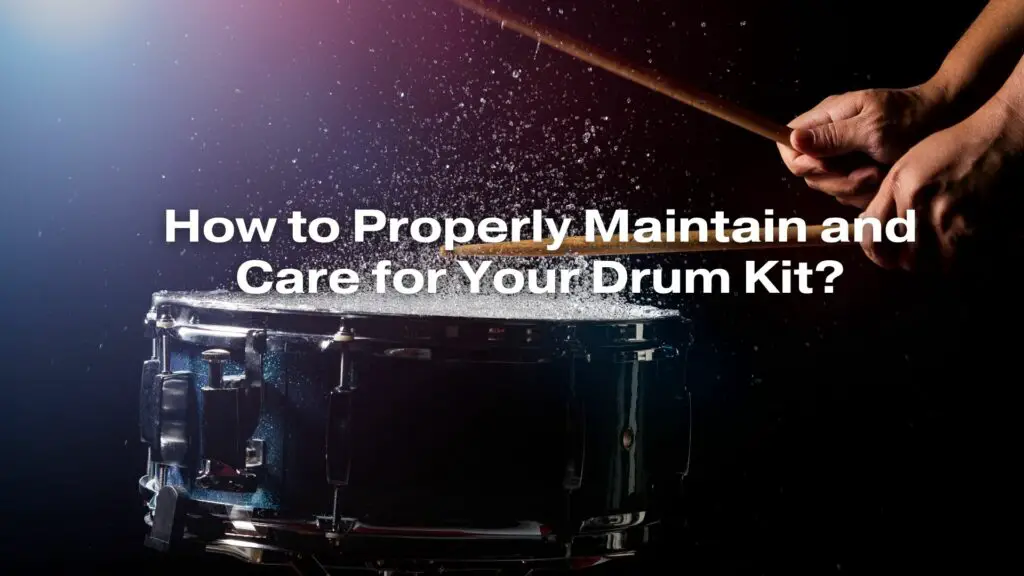The drum kit is the heartbeat of any band, providing rhythm and energy to music. Whether you’re a professional drummer or just starting out, taking proper care of your drum kit is essential to ensure it stays in good shape and continues to sound great. Regular maintenance can extend the life of your drums, improve their performance, and save you money on costly repairs or replacements. In this article, we’ll guide you through the steps to properly maintain and care for your drum kit.
1. Keep it clean:
One of the most fundamental aspects of drum kit maintenance is keeping it clean. After each practice session or performance, wipe down the drums, cymbals, and hardware with a soft, dry cloth to remove dust and sweat. Dust and grime can accumulate on the drumheads and cymbals, affecting their sound quality. Avoid using harsh chemicals or abrasive materials that could damage the finishes.
2. Tune your drums:
Regular tuning is crucial for maintaining the sound quality of your drum kit. Tune your drums before every practice session or gig to ensure they sound their best. Use a drum key to tighten or loosen the tension rods on the drumheads to achieve the desired pitch. Learning to tune your drums effectively can make a significant difference in the overall sound of your kit.
3. Replace drumheads as needed:
Drumheads are subject to wear and tear over time. If you notice cracks, dents, or a loss of tone in your drumheads, it’s time to replace them. High-quality drumheads can drastically improve the sound of your drums. Make sure to choose drumheads that match your musical style and preferences.
4. Inspect and maintain hardware:
Check the hardware of your drum kit regularly. Tighten any loose bolts, lugs, or wing nuts. Lubricate the moving parts, such as the pedal springs and hi-hat stand, with an appropriate lubricant to ensure smooth operation. If you have a double-bass pedal, make sure the linkage and bearings are in good condition.
5. Protect your drum kit during transport:
When you transport your drum kit to gigs or practice sessions, invest in proper cases or bags. This protection not only prevents damage but also keeps your drums and hardware clean and free from scratches. Use padded cases for cymbals, and ensure that your drums are secured in a sturdy case or bag.
6. Store your kit in a suitable environment:
Humidity and temperature can impact the condition of your drum kit. Store your drums in a cool, dry place, and avoid exposing them to extreme temperature fluctuations. Extreme humidity can lead to warping and damage to wooden components, so it’s crucial to maintain a stable environment.
7. Play with care:
While it’s tempting to give your drums a powerful beating, playing too hard can lead to premature wear and tear. Use appropriate drumming techniques to maximize the life of your drumheads and cymbals. Additionally, consider using shock-absorbing accessories like drumstick sleeves and practice pads during intense practice sessions to reduce stress on your kit.
8. Maintain your cymbals:
Cymbals are a critical part of your drum kit, and they too require proper care. After playing, wipe your cymbals with a soft cloth to remove sweat and fingerprints. Avoid over-tightening the wing nuts, as it can lead to cracks. If you notice any cracks or keyholing (worn holes around the bell), it’s time to replace your cymbals.
9. Invest in regular professional maintenance:
While you can handle most maintenance tasks on your own, it’s a good idea to schedule occasional professional maintenance for your drum kit. Drum technicians can perform more extensive checks and repairs, ensuring your kit’s longevity and optimal performance.
Taking care of your drum kit is not only about preserving its appearance but also about maintaining its sound and performance. With proper maintenance and care, your drum kit can continue to deliver that signature beat for years to come, allowing you to make beautiful music without unnecessary distractions or expenses. So, take the time to care for your drum kit, and it will reward you with consistent and top-notch performance.


